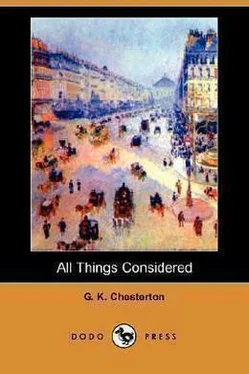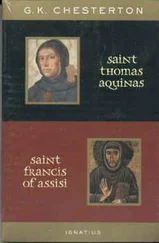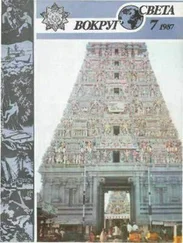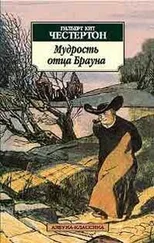And I must say that the historical method seems to me excessively unreasonable. I have no knowledge of history, but I have as much knowledge of reason as Anatole France. And, if anything is irrational, it seems to me that the Renan–France way of dealing with miraculous stories is irrational. The Renan–France method is simply this: you explain supernatural stories that have some foundation simply by inventing natural stories that have no foundation. Suppose that you are confronted with the statement that Jack climbed up the beanstalk into the sky. It is perfectly philosophical to reply that you do not think that he did. It is (in my opinion) even more philosophical to reply that he may very probably have done so. But the Renan–France method is to write like this: "When we consider Jack's curious and even perilous heredity, which no doubt was derived from a female greengrocer and a profligate priest, we can easily understand how the ideas of heaven and a beanstalk came to be combined in his mind. Moreover, there is little doubt that he must have met some wandering conjurer from India, who told him about the tricks of the mango plant, and how t is sent up to the sky. We can imagine these two friends, the old man and the young, wandering in the woods together at evening, looking at the red and level clouds, as on that night when the old man pointed to a small beanstalk, and told his too imaginative companion that this also might be made to scale the heavens. And then, when we remember the quite exceptional psychology of Jack, when we remember how there was in him a union of the prosaic, the love of plain vegetables, with an almost irrelevant eagerness for the unattainable, for invisibility and the void, we shall no longer wonder that it was to him especially that was sent this sweet, though merely symbolic, dream of the tree uniting earth and heaven." That is the way that Renan and France write, only they do it better. But, really, a rationalist like myself becomes a little impatient and feels inclined to say, "But, hang it all, what do you know about the heredity of Jack or the psychology of Jack? You know nothing about Jack at all, except that some people say that he climbed up a beanstalk. Nobody would ever have thought of mentioning him if he hadn't. You must interpret him in terms of the beanstalk religion; you cannot merely interpret religion in terms of him. We have the materials of this story, and we can believe them or not. But we have not got the materials to make another story."
It is no exaggeration to say that this is the manner of M. Anatole France in dealing with Joan of Arc. Because her miracle is incredible to his somewhat old–fashioned materialism, he does not therefore dismiss it and her to fairyland with Jack and the Beanstalk. He tries to invent a real story, for which he can find no real evidence. He produces a scientific explanation which is quite destitute of any scientific proof. It is as if I (being entirely ignorant of botany and chemistry) said that the beanstalk grew to the sky because nitrogen and argon got into the subsidiary ducts of the corolla. To take the most obvious example, the principal character in M. France's story is a person who never existed at all. All Joan's wisdom and energy, it seems, came from a certain priest, of whom there is not the tiniest trace in all the multitudinous records of her life. The only foundation I can find for this fancy is the highly undemocratic idea that a peasant girl could not possibly have any ideas of her own. It is very hard for a freethinker to remain democratic. The writer seems altogether to forget what is meant by the moral atmosphere of a community. To say that Joan must have learnt her vision of a virgin overthrowing evil from a priest, is like saying that some modern girl in London, pitying the poor, must have learnt it from a Labour Member. She would learn it where the Labour Member learnt it—in the whole state of our society.
But that is the modern method: the method of the reverent sceptic. When you find a life entirely incredible and incomprehensible from the outside, you pretend that you understand the inside. As Renan, the rationalist, could not make any sense out of Christ's most public acts, he proceeded to make an ingenious system out of His private thoughts. As Anatole France, on his own intellectual principle, cannot believe in what Joan of Arc did, he professes to be her dearest friend, and to know exactly what she meant. I cannot feel it to be a very rational manner of writing history; and sooner or later we shall have to find some more solid way of dealing with those spiritual phenomena with which all history is as closely spotted and spangled as the sky is with stars.
Joan of Arc is a wild and wonderful thing enough, but she is much saner than most of her critics and biographers. We shall not recover the common sense of Joan until we have recovered her mysticism. Our wars fail, because they begin with something sensible and obvious—such as getting to Pretoria by Christmas. But her war succeeded—because it began with something wild and perfect—the saints delivering France. She put her idealism in the right place, and her realism also in the right place: we moderns get both displaced. She put her dreams and her sentiment into her aims, where they ought to be; she put her practicality into her practice. In modern Imperial wars, the case is reversed. Our dreams, our aims are always, we insist, quite practical. It is our practice that is dreamy.
It is not for us to explain this flaming figure in terms of our tired and querulous culture. Rather we must try to explain ourselves by the blaze of such fixed stars. Those who called her a witch hot from hell were much more sensible than those who depict her as a silly sentimental maiden prompted by her parish priest. If I have to choose between the two schools of her scattered enemies, I could take my place with those subtle clerks who thought her divine mission devilish, rather than with those rustic aunts and uncles who thought it impossible.
With Francis Thompson we lose the greatest poetic energy since Browning. His energy was of somewhat the same kind. Browning was intellectually intricate because he was morally simple. He was too simple to explain himself; he was too humble to suppose that other people needed any explanation. But his real energy, and the real energy of Francis Thompson, was best expressed in the fact that both poets were at once fond of immensity and also fond of detail. Any common Imperialist can have large ideas so long as he is not called upon to have small ideas also. Any common scientific philosopher can have small ideas so long as he is not called upon to have large ideas as well. But great poets use the telescope and also the microscope. Great poets are obscure for two opposite reasons; now, because they are talking about something too large for any one to understand, and now again because they are talking about something too small for any one to see. Francis Thompson possessed both these infinities. He escaped by being too small, as the microbe escapes; or he escaped by being too large, as the universe escapes. Any one who knows Francis Thompson's poetry knows quite well the truth to which I refer. For the benefit of any person who does not know it, I may mention two cases taken from memory. I have not the book by me, so I can only render the poetical passages in a clumsy paraphrase. But there was one poem of which the image was so vast that it was literally difficult for a time to take it in; he was describing the evening earth with its mist and fume and fragrance, and represented the whole as rolling upwards like a smoke; then suddenly he called the whole ball of the earth a thurible, and said that some gigantic spirit swung it slowly before God. That is the case of the image too large for comprehension. Another instance sticks in my mind of the image which is too small. In one of his poems, he says that abyss between the known and the unknown is bridged by "Pontifical death." There are about ten historical and theological puns in that one word. That a priest means a pontiff, that a pontiff means a bridge–maker, that death is certainly a bridge, that death may turn out after all to be a reconciling priest, that at least priests and bridges both attest to the fact that one thing can get separated from another thing—these ideas, and twenty more, are all actually concentrated in the word "pontifical." In Francis Thompson's poetry, as in the poetry of the universe, you can work infinitely out and out, but yet infinitely in and in. These two infinities are the mark of greatness; and he was a great poet.
Читать дальше








